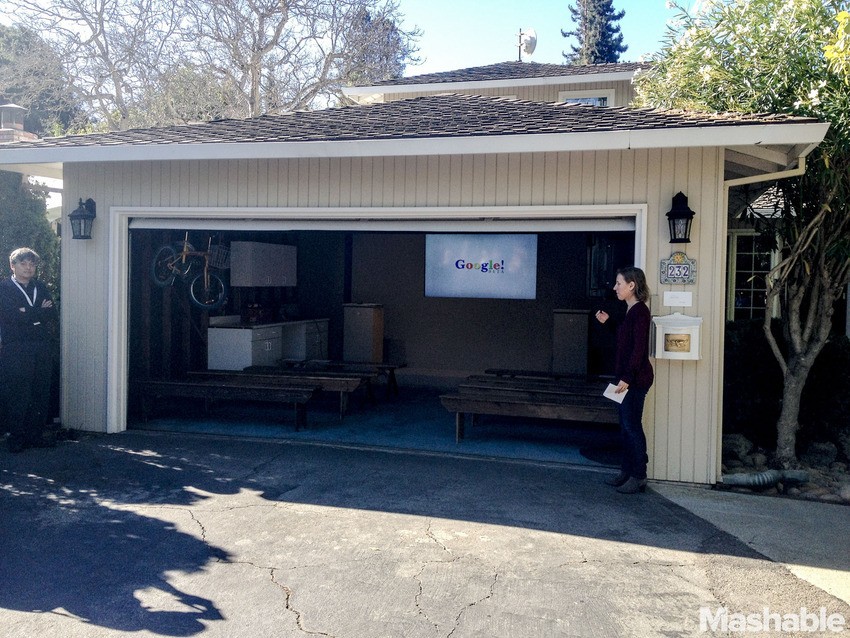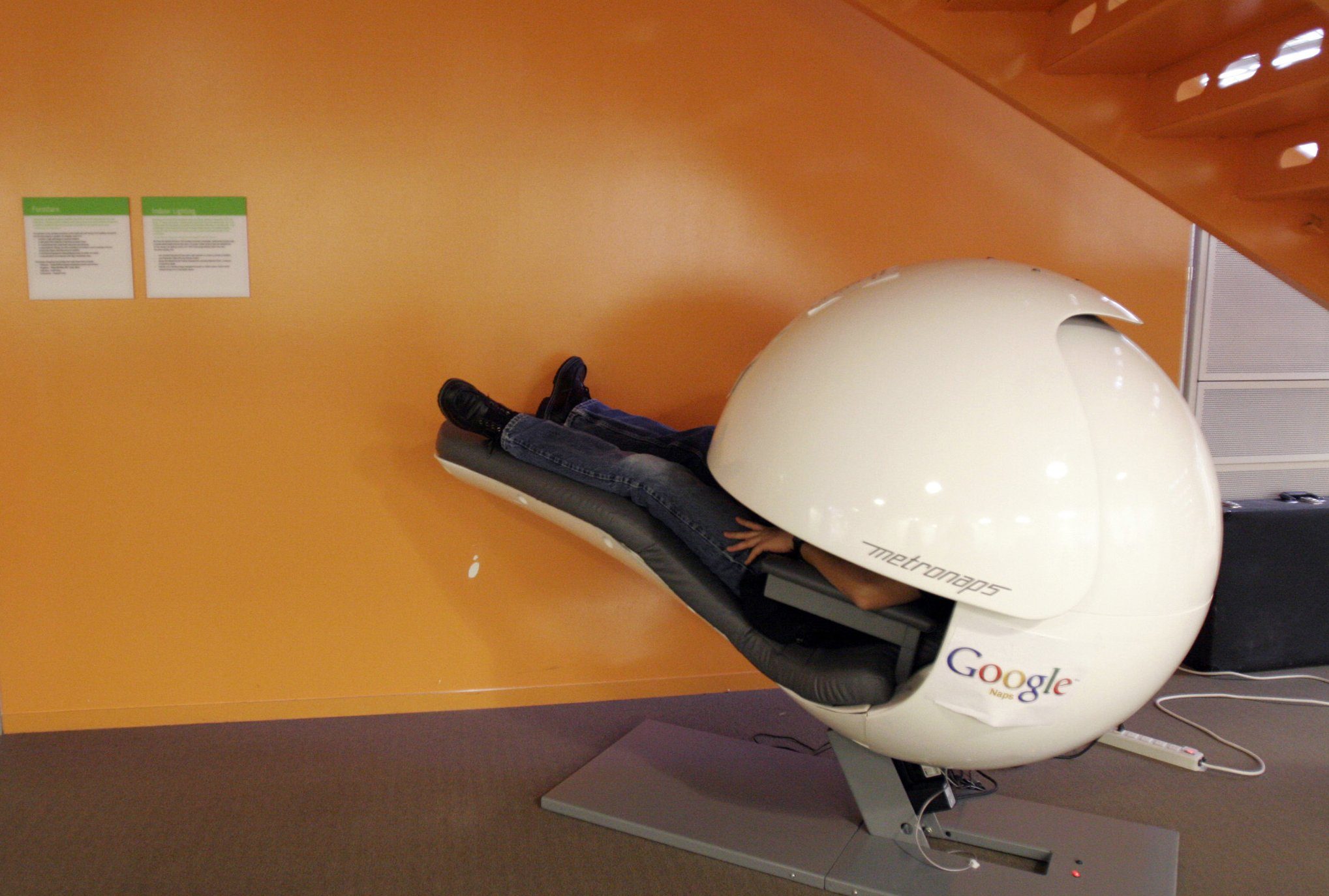1. Google’s name is misspelled
The name is a play on the word “googol” (1 followed by 100 zeroes), because Brin and Page wanted to organize a “seemingly infinite amount of information on the web.”
2. Brin and Page are college dropouts (kinda)
Both young men had completed their master’s degrees and were on their way to becoming computer science “doctors” when the matter of a soon-to-be billion-dollar company got in the way.
3. Google’s was once housed in a rented garage
4. Like prisoners, every Google employee has a number
It started with Page and Brin (Google Employees nos. 1 and 2) and extends to the 50 000th employee (Google has roughly 55 000 employees). To some, referring to professionals by a number might seem rude, or cult-like. But if you’re a hugely successful company, you can get away with just about anything.
5. Is that Sergey Brin in a cow costume stroking his udder?
That actually happened, during a job interview, according to Doug Edwards, in his book, I’m Feeling Lucky: The Confessions of Google Employee Number 59.
6. Not every perk at the Googleplex is free.
The company is famous for treating its employees to the high life at its “Googleplex” headquarters in Mountain View, California: Free lunch (and breakfast, and dinner), free haircuts, free state-of-the-art gym, and the greatest workplace invention ever, the nap pod (see below). But some luxuries come at a cost, like full-body massages and dry cleaning. And some are downright exorbitant: Google once infamously hiked its onsite day care costs from $33,000 per child per year to $57,000.
7. Google’s “do what you want” employee perk may be dead or dying
That claim is being made by some current and former employees who bemoan the demise of the Innovation Time Off program. That program lets employees tackle undirected pet projects for one day a week (or 20% of their work hours). Google denies this charge. And that’s good, because it would be sad to lose a perk that resulted in Gmail, Google News, and AdSense (the pay-per-click ad platform, which accounts for 25% of the company’s revenue).
8. Google has lost top talent to its competitors
Several former executives have bolted Mountain View for competitors like Facebook (Gideon Yu, Sheryl Sandberg), Yahoo (Marissa Mayer), and even the U.S. government (Megan Smith, the nation’s Chief Technology Officer).
9. Technically, Google is more than 150 companies rolled into one
The company has acquired nearly 200 technology businesses since its inception, including YouTube, Waze (a GPS navigation app), and GrandCentral, the VoIP platform that now exists as Google Voice.
10. Google doesn’t make “droids”
This may come as a surprise to some iPhone users, who are accustomed to Apple’s hands in every aspect of the products they sell. Google’s primary smartphone product is not hardware, but software: the Android mobile operating system. For a brief period, Google owned the smartphone manufacturer Motorola Mobility, whose Android-powered phones (one of them is actually called the Droid) make up less than 6% of the Android market. Google’s own Nexus smartphones and tablets–like the new Nexus 6–are actually manufactured by LG, HTC, or Motorola Mobility.
11. Google Glass may be coming to an airport near you
One of Google’s chief hardware plays is Google Glass, the wearable technology that raised eyebrows when it was unveiled (and will soon have competition). Richard Branson’s Virgin Atlantic, a consistent technology first-adopter, is the first airline to try Google Glass to scan boarding passengers’ passports.
12. Google has been involved with some spectacular failures
Anyone remember Knol, Google’s attempt to compete with Wikipedia? Or the messaging apps Google Wave and Google Buzz? What about the social network Orkut? It held on for 10 years, thanks to a large fan base in India and Brazil, but has finally died an honorable death.
13. Google is assembling an army of robots in its secretive skunkworks lab
Not just robots, but a driver-less car, which is already legal in California, as well as Google Glass (see #11), and other “moonshot” ideas. The semi-secret lab, called GoogleX, aims to improve technology “by a factor of 10… [and to] develop science-fiction-sounding solutions.”
14. Google wants the human genetic map to be searchable
The latest GoogleX project, called Baseline Study, will collect and analyze biological samples from 175 individuals (followed by thousands more) in order to create a molecular database that can be searched for bio-markers (indicators of specific maladies).
15. The company has one true “don’t be evil” division
Google.org, the company’s “do good” philanthropic arm, says that it donates every year $100 million in grants and $1 billion worth of products to nonprofit firms and community causes.
16. Google joins the search to find the root causes of autism
One of those community causes is MSSNG, a project of the research-funding and advocacy organization Autism Speaks that will use Google’s Cloud platform to store the genomes of people with autism and their families. The goal is create an open-access database for scientists around the world to analyze.
17. By their own admission, Google has a diversity problem
Its first ever diversity report revealed that just 30% of its employees are women and a combined 5% are Black or Hispanic.
18. Historically, Google has been consistent, if nothing else, with its hiring of women
Coincidentally (or not), 6 of its first 21 employees (or 29%) were women–the 21st, Yahoo CEO Marissa Mayer, is probably the most high-profile woman associated with Google.
19. Google can read your mind
It’s been doing that since 1 April, 2000. Don’t believe it? Enter Google’s MentalPlex and find out for yourself. And if you believe that, then you probably haven’t noticed the date on that website.
20. Google had an internal white board that listed a plan to colonize Mars
So says Google Employee no. 59 in his book, I’m Feeling Lucky. (A different white board photo, which featured the idea of orbital mind control,” is shown above as the feature image). “People would just write anything on [the Google white board], and [outsiders] would come and say, “Is this for real?” said Edwards to Fast Company. “There was everything from Colonize Mars, to Take Over This Industry—all sorts of things that would not have gone over well with the Justice Department. They were all meant in jest,” he adds, “but were just close enough to reality that people would be like, Are they really gonna do that?” Featured photo credit: Google Whiteboard/Yoz Grahame via regmedia.co.uk


